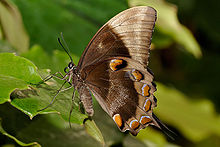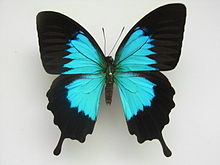- Papilio ulysses
-
Ulysses butterfly Male Scientific classification Kingdom: Animalia Phylum: Arthropoda Class: Insecta Order: Lepidoptera Family: Papilionidae Genus: Papilio Species: P. ulysses Binomial name Papilio ulysses
Linnaeus, 1758Subspecies - P. u. autolycus C.Felder & R.Felder, 1865
- P. u. denticulatus Joicey & Talbot, 1916
- P. u. dirce Jordan, 1909
- P. u. jennifeae Jakusch, 2007
- P. u. ulysses Linnaeus, 1758
The Ulysses butterfly (Papilio ulysses), also known as the Blue Mountain Butterfly or the Blue Mountain Swallowtail is a large swallowtail butterfly, endemic to Australasia.
This butterfly is used as an emblem for Queensland tourism.
Contents
Etymology
Ulysses is the Roman name for the Greek hero, Odysseus, a character in ancient Greek literature, the central character of Homer's Odyssey.
Distribution
 Ulysses butterfly, Melbourne Zoo
Ulysses butterfly, Melbourne Zoo
The Ulysses butterfly is endemic to a portion Australasia; northeastern Australia (eastern Queensland), New Guinea, the Moluccas, Bismarck Archipelago and northwestern Solomons (the similar relative P. montrouzieri is from New Caledonia).
Description
The Ulysses butterfly typically has a wingspan of about 14 cm (5.5 inches), but depending on subspecies there are some variations in size. The upperside of the wings are an iridescent electric blue; the underside is a more subdued black and brown in colouration. The colours are produced by the microscopic structure of the scales.[1]
The female of the species is different from the male in that she has little crescents of blue in the back, upside sections of her hind wings, where there is only black for males. When the butterfly is perched the intense blue of its wings is hidden by the plainer brown under side of its wings, helping it to blend in with its surroundings. When in flight, the butterfly can be seen hundreds of metres away as sudden bright blue flashes. Males are strongly attracted to blue objects which they mistake for females.
Diet and Conservation
Conservation
The Ulysses butterfly inhabits tropical rainforest areas and suburban gardens. It is protected by the Australian government, although the species is not endangered. In the past this butterfly had been threatened but by planting Pink Flowered Doughwood it has helped increase numbers. The reduction in numbers of the Euodia tree, a tree heavily used for laying eggs and leaves eaten by caterpillars, may threaten the survival of this butterfly. Females favour small trees up to 2 metres tall to lay their eggs.
Predators include birds, flying foxes, snakes, and frogs.
Diet
Foods for this butterfly include: kerosene wood, a variety of citrus plants and Euodia. In Australia, the Ulysses butterfly's favorite food plant is the Pink Flowered Doughwood, a tree with clusters of small pink flowers growing straight out of the branches.
See also
References
External links
Categories:- Papilio
- Animals described in 1758
Wikimedia Foundation. 2010.


